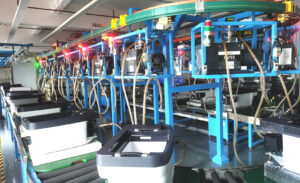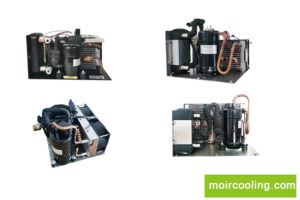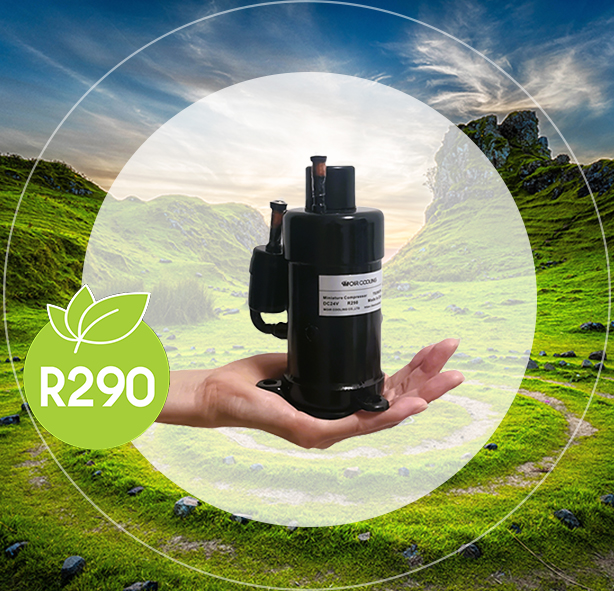Introduction
In recent years, micro compressor cooling system has emerged as a critical component in various applications due to their advantages compared with other technogoies, both active and passive cooling. These compact systems are designed to provide efficient cooling solutions, enabling systems to operate more effectively and reliably for a wide range of industries, from electronics and personal devices to industrial processes. This article explores the diverse applications of small-scale compressor cooling modules, highlighting their benefits and the innovative approaches that have driven their development.
Applications in Electronics and Precision Instruments
1. Electronics Cooling: Keeping Components within Safe Limits
One of the primary applications of small-scale compressor cooling systems is in the cooling of electronic components. As electronic devices continue to become more powerful and compact, the need for effective thermal management has never been greater. High-performance CPUs, GPUs, and other components generate significant amounts of heat during operation, which can lead to thermal throttling, performance degradation, and even system failure if not properly managed.
The miniature compressor cooling units provide a solution to this challenge. By utilizing a combination of refrigerant-based cooling and compact compressor technology, these modules can efficiently dissipate heat from electronic components, keeping them within safe operating temperatures. This not only enhances the performance and reliability of electronic devices but also extends their lifespan by reducing thermal stress on critical components.
2. Refrigeration Systems: Efficient and Space-Saving Solutions
Traditional refrigeration units often require bulky compressors and extensive cooling networks, limiting their flexibility and efficiency in small or confined spaces. However, micro compressor cooling units offer a more compact and efficient alternative.
These units are designed to provide high levels of cooling performance while occupying minimal space. They are ideal for use in applications such as mini-refrigerators, beverage coolers, and medical storage units, where space is a premium and energy efficiency is crucial. By integrating miniature refrigeration units into these systems, manufacturers can achieve superior cooling performance while reducing overall energy consumption and footprint.

3. Automotive Industry: Enhancing Vehicle Performance and Comfort
The automotive industry has also benefited greatly from the advancements in miniature cooling technology. Modern vehicles are equipped with a variety of electronic systems and components that require precise temperature control to ensure optimal performance and reliability. From advanced driver assistance systems (ADAS) to infotainment displays, these components generate significant amounts of heat that must be managed effectively.
The mini compressor cooling units play a vital role in automotive thermal management systems. They are used to cool electronic control units (ECUs), battery packs, and other critical components, ensuring that they operate within safe temperature ranges. Additionally, these modules contribute to enhanced passenger comfort by providing efficient air conditioning systems that maintain a consistent cabin temperature, regardless of external conditions.
4. Medical Applications: Ensuring the Safety and Efficacy of Medical Devices
Medical devices such as MRI machines, lasers, and ultrasound systems rely on precise temperature control to ensure their safety and efficacy. Any deviation from optimal operating temperatures can compromise the performance of these devices, potentially leading to inaccurate diagnoses or treatment outcomes.
Compact liquid refrigeration systems offer a reliable and efficient solution for medical device cooling. By maintaining consistent temperatures within critical ranges, these systems help ensure the accuracy and reliability of medical devices. They are also designed to meet stringent regulatory requirements, ensuring that they are safe and effective for use in medical environments.
5. Aerospace and Defense: Supporting High-Performance Systems in Extreme Conditions
The aerospace and defense demand robust and reliable cooling systems that can operate in extreme conditions, such as high altitudes, low temperatures, and intense vibrations. miniature compressor cooling systems are well-suited for these challenges, providing high levels of cooling performance while maintaining a compact and lightweight design.
In aerospace applications, these cooling modules are used to cool avionics systems, sensors, and other critical components, ensuring that they operate reliably in harsh environments. In defense systems, they support the cooling of radar systems, missiles, and other high-performance weapons and equipment. By providing precise temperature control, the compact systems help ensure the success of missions and the safety of personnel.
Advantages of Micro Compressor Cooling System
1. Compact Design: These cooling systems are designed to be compact, making them ideal for integration into small spaces. This is particularly important in domestic appliances, automotive systems, or any other application where space is limited. The compact design also allows for easier installation and maintenance.
2. Customization and Flexibility: Small cooling systems can be customized to meet specific application requirements. This includes variations in cooling capacity, size, and integration with other system components. This flexibility allows manufacturers to design systems that are tailored to the specific needs of their customers.
3. Energy Efficiency: With the increasing focus on energy conservation and sustainability, mini chiller modules are designed to be energy-efficient. They use less power to provide the necessary cooling, reducing energy consumption and lowering operating costs.
Innovations in Miniature Refrigeration Systems
Recent advancements in vapor compression technologies have focused on the miniaturization of mechanical vapor compression refrigeration systems. These developments have been driven by the need for more compact and efficient cooling solutions. The thermodynamic and thermal aspects of these systems have been extensively studied, with significant progress made in the miniaturization of critical components such as compressors . This trend towards miniaturization is evident in the design and testing of miniature compressors, which have demonstrated technical feasibility for refrigeration applications .
MOIR’s Micro Compressor tech, for instance, is renowned for its exceptional design and performance, offering a compact footprint that allows for easy integration into tight spaces . This makes it particularly suitable for mini cooling units and applications with limited room. Additionally, the development of R290 rotary compressors for small refrigeration units underscores the growing demand for efficient cooling solutions in electrical cooling applications .
Sustainable Cooling Solutions
As environmental sustainability becomes increasingly urgent, the refrigeration industry is adopting eco-friendly alternatives to traditional compressor-based systems. Moir’s mini cooling systems, for example, leads in sustainable cooling solutions with its innovative heat exchangers and advanced compressors . These systems not only offer precise cooling control but also contribute to reducing emissions and energy consumption.
Conclusion
Micro compressor cooling system has revolutionized cooling solutions across multiple industries. From medical sector to EV applications, these compact systems offer enhanced efficiency, improved performance, and cost-effective solutions. As research and development continue to advance, we can expect even more innovative applications of miniature cooling solutions in the future.









